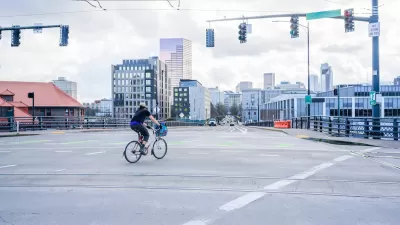As you may have heard in yesterday's Planetizen Podcast, Virginia Governor Tim Kaine doesn't like cul-de-sacs. Most news reports on the story have claimed that the state is "forbidding," "banning," or even "outlawing" the cul-de-sac. In fact, Virginia municipalities can still design, build, and approve any road patterns they wish, but the State will no longer agree to foot the bill for the ongoing maintenance of cul-de-sacs. The news item came up in a staff meeting yesterday and one colleague told us that a friend he was having dinner with declared the move "Un-American!"
As you may have heard in yesterday's Planetizen Podcast, Virginia Governor Tim Kaine doesn't like cul-de-sacs.
Most news reports on the story have claimed that the state is "forbidding," "banning," or even "outlawing" the cul-de-sac. In fact, Virginia municipalities can still design, build, and approve any road patterns they wish, but the State will no longer agree to foot the bill for the ongoing maintenance of cul-de-sacs. The news item came up in a staff meeting yesterday and one colleague told us that a friend he was having dinner with declared the move "Un-American!"
In a brilliant stroke of spin, Virginia is not posing the new legislation as a regulation that hinders individual or municipal liberties, but rather as a cost- and time-saving measure. By not having to send unwieldly maintenance and emergency vehicles up any future cul-de-sacs (or along the crowded arterials that carry every trip made from a cul-de-sac dominated subdivision), the state can respond faster to emergencies and save boku bucks on road maintenance.
My favorite news story on the subject is this one, mostly because the reporters talked to a lawyer for Biscuit Run, a hilariously named new development just outside of Charlottesville. Steven Blaine, an attorney for the Biscuit Run developer, fell into much of the same argument against cul-de-sacs that new and old urbanists alike have been using for years: "we
want to make it easy for people who live in the community to get from
one part of the community to the other." The brilliance of the Virginia arguments are that they are difficult to
oppose on a libertarian ground..."so, you want to have the liberty to
live on a cul-de-sac? Then, I assume you're also happy paying higher
taxes for the road maintenance and service, yes?" Tim Kaine makes the new urbanist arguments look somehow namby pamby, even while he accomplishes their objective.
If an editorial is more your style on this subject than a bland news article--even one about Biscuits and Running--than news, this commentary has some pretty funny hyperbole and a great accompanying photo. The author here captures my own annoyance at the opponents of this policy who claim that they prefer living on a cul-de-sac because _it's safer_. The Virginia Home Builders and others seem to believe that their children can frolick in the cul-de-sac without ever encountering danger. They forget about the social dangers of isolation and the health dangers of extraordinary commutes, but, as Tim Kaine points out, they're also forgetting about how much longer emergency rescue vehicles muct sit in traffic in a cul-de-sac-heavy road network.
Luckily for us, Roman Polanski has already made a farce of this "safety" notion with his 1966 film, Cul-de-Sac. I've never seen it, but it appears to be a pretty subversive sexual study of what happens when two criminals on the lam crash at a couple's beachfront mansion, at the end of...of course...a cul-de-sac. Nextflix queue, ho!

Maui's Vacation Rental Debate Turns Ugly
Verbal attacks, misinformation campaigns and fistfights plague a high-stakes debate to convert thousands of vacation rentals into long-term housing.

Planetizen Federal Action Tracker
A weekly monitor of how Trump’s orders and actions are impacting planners and planning in America.

San Francisco Suspends Traffic Calming Amidst Record Deaths
Citing “a challenging fiscal landscape,” the city will cease the program on the heels of 42 traffic deaths, including 24 pedestrians.

Bend, Oregon Zoning Reforms Prioritize Small-Scale Housing
The city altered its zoning code to allow multi-family housing and eliminated parking mandates citywide.

Amtrak Cutting Jobs, Funding to High-Speed Rail
The agency plans to cut 10 percent of its workforce and has confirmed it will not fund new high-speed rail projects.

LA Denies Basic Services to Unhoused Residents
The city has repeatedly failed to respond to requests for trash pickup at encampment sites, and eliminated a program that provided mobile showers and toilets.
Urban Design for Planners 1: Software Tools
This six-course series explores essential urban design concepts using open source software and equips planners with the tools they need to participate fully in the urban design process.
Planning for Universal Design
Learn the tools for implementing Universal Design in planning regulations.
planning NEXT
Appalachian Highlands Housing Partners
Mpact (founded as Rail~Volution)
City of Camden Redevelopment Agency
City of Astoria
City of Portland
City of Laramie






























